Heucheras are shade-loving perennial plants native to North America, prized for their attractive foliage that comes in a wide range of colors. These versatile plants make excellent ground cover and are popular in winter pot displays. But taking care of Heuchera plants in the UK requires the right knowledge and attention.
In this article, I will guide you through the essential steps of Heuchera plant care, including light requirements, watering tips, fertilizing, pruning, propagation, and repotting. By following these guidelines, you can ensure the health and vitality of your Heuchera plants, and enjoy their stunning beauty in your garden for years to come.
Appearance of Heuchera Plant (Coral Bells)
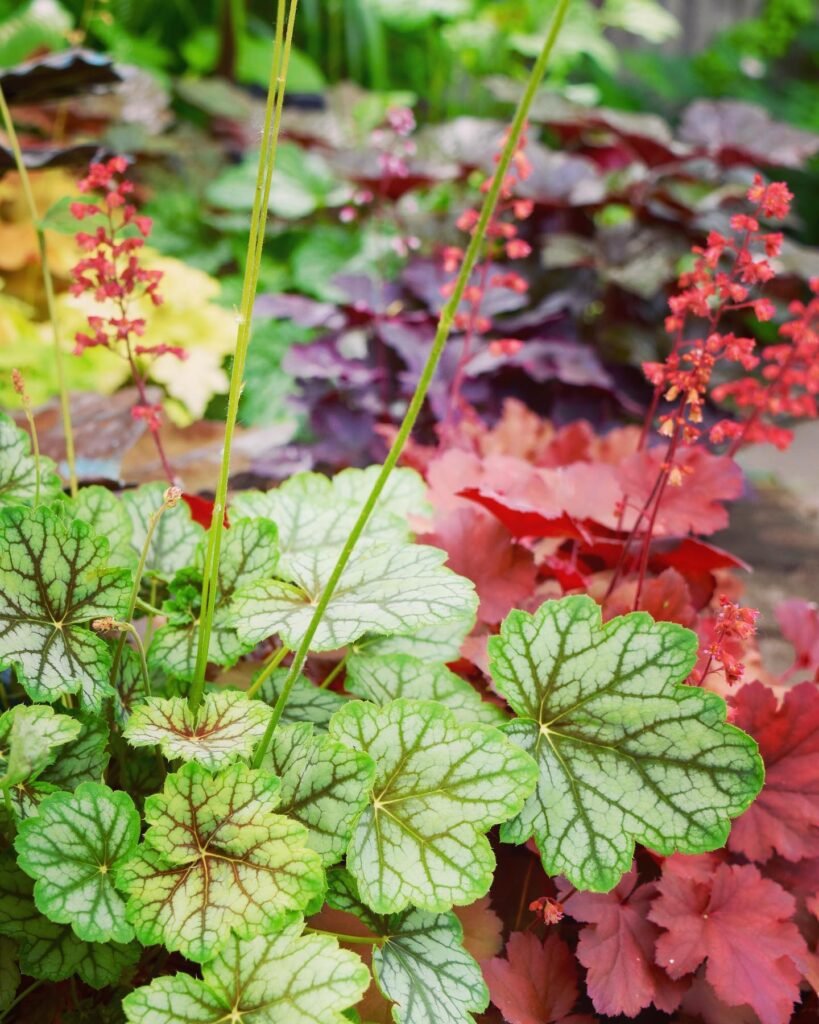
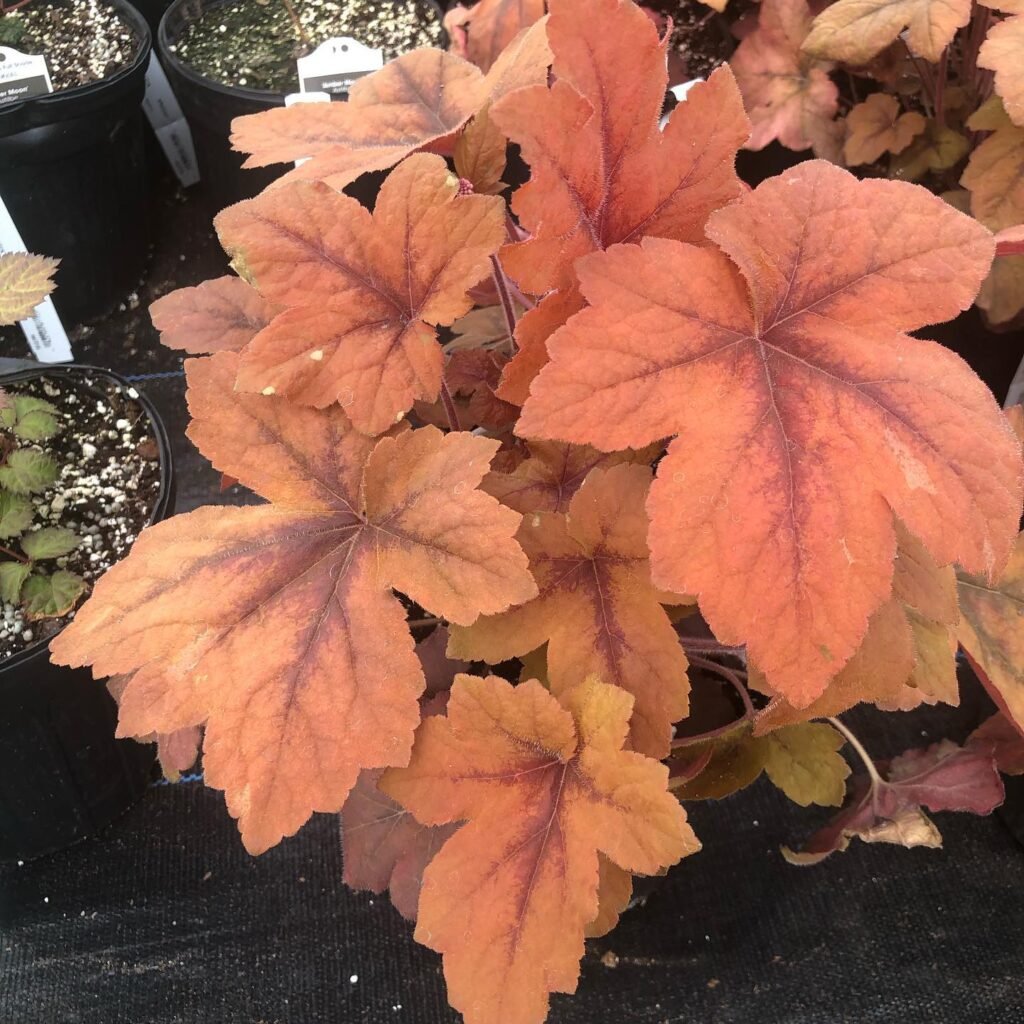
Heuchera plants, also known as Coral Bells, are truly a sight to behold in the garden. With their stunning variety of leaf colors and textures, they add a touch of elegance and beauty to any landscape. Whether you choose a fiery red, regal purple, shimmering silver, or vibrant green, Heuchera plants are sure to make a statement.
The leaves of Heuchera plants are often lobed or scalloped, giving them a unique and intricate appearance. Some varieties even have variegated or marbled leaves, creating a mesmerizing play of colors. These captivating foliage patterns add visual interest and depth to the garden, making Heuchera plants a popular choice among gardeners.
But the allure of Heuchera plants doesn’t stop at their leaves. The flowers of these plants are equally charming. Small and tubular, the delicate blooms often come in an array of colors, with colorful calyxes that further enhance their beauty. While the flowers may not be the main attraction of Heuchera plants, they lend a lovely touch to their overall appeal.
When it comes to their growth habit, Heuchera plants form compact, rounded clumps. This habit makes them ideal for creating borders, filling in garden spaces, or even adding texture to rock gardens. Their ability to provide year-round color and interest makes Heuchera plants a versatile choice that can be appreciated throughout the seasons.
 Did you know Heuchera showcases an array of leaf colours, from deep purples to vibrant greens, rich reds, and shimmering silvers, based on sunlight exposure? This unique feature adds dynamic colour to gardens with just a change in light.
Did you know Heuchera showcases an array of leaf colours, from deep purples to vibrant greens, rich reds, and shimmering silvers, based on sunlight exposure? This unique feature adds dynamic colour to gardens with just a change in light.
Light Requirements for Heuchera Plant
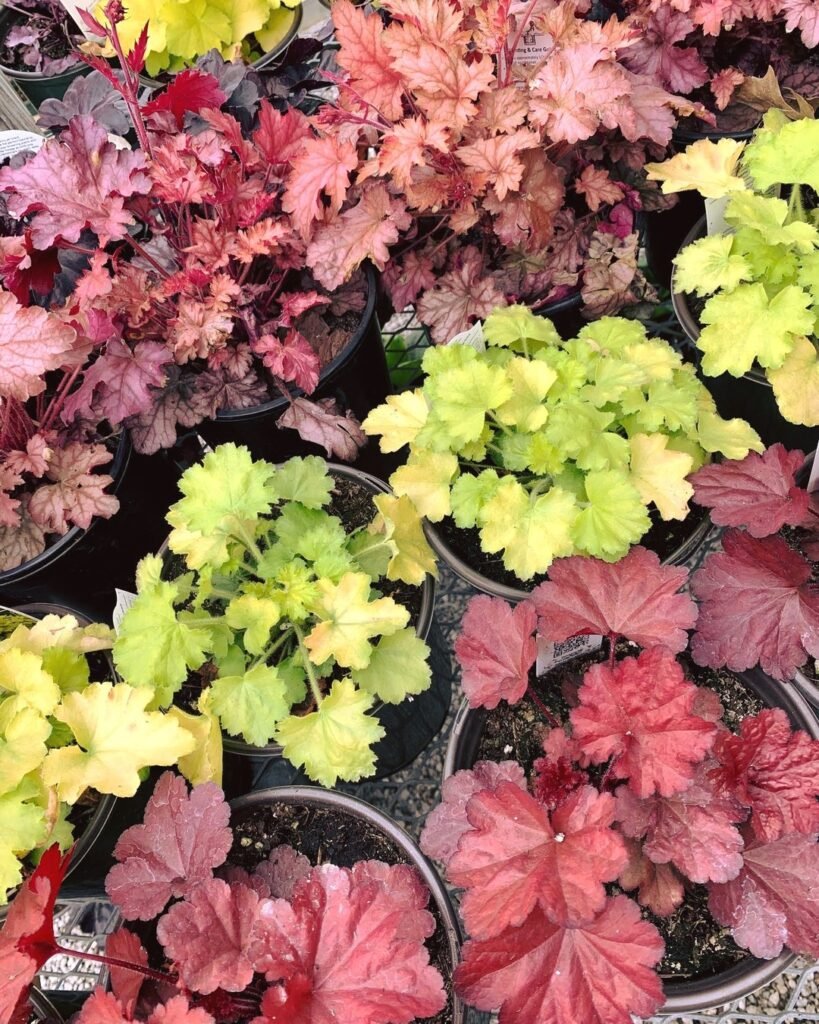
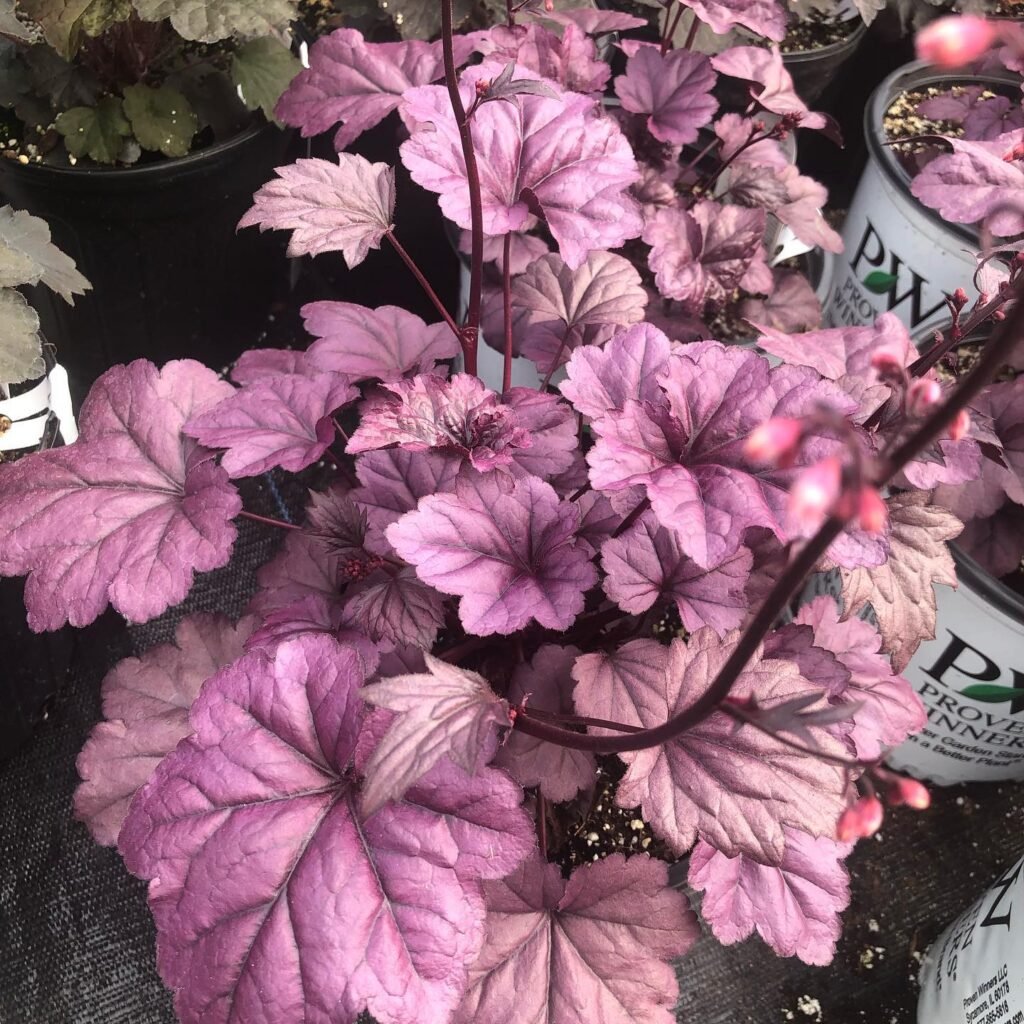
Heuchera plants, also known as Coral Bells, have specific light requirements to thrive and showcase their vibrant foliage. It’s important to provide the ideal light conditions for these beautiful shade-loving perennials.
Most Heuchera varieties prefer to be in areas with bright, indirect light, such as dappled shade or partial sun. Direct sunlight can be too intense and may scorch their delicate leaves. It is recommended to place them in locations where they can enjoy filtered sunlight throughout the day.
However, it’s important to note that there are exceptions among different Heuchera varieties. Some dark-leaved varieties can tolerate more sun exposure, while varieties with paler leaves prefer shadier spots. The specific light requirements for each variety can usually be found on the plant label or in the accompanying care instructions.
To ensure the optimal growth and coloration of your Heuchera plants, it is essential to strike the right balance between light and shade. Providing them with their preferred light conditions will help them thrive and contribute to a stunning display in your garden.

Watering Tips for Heuchera Plant (Coral Bells)
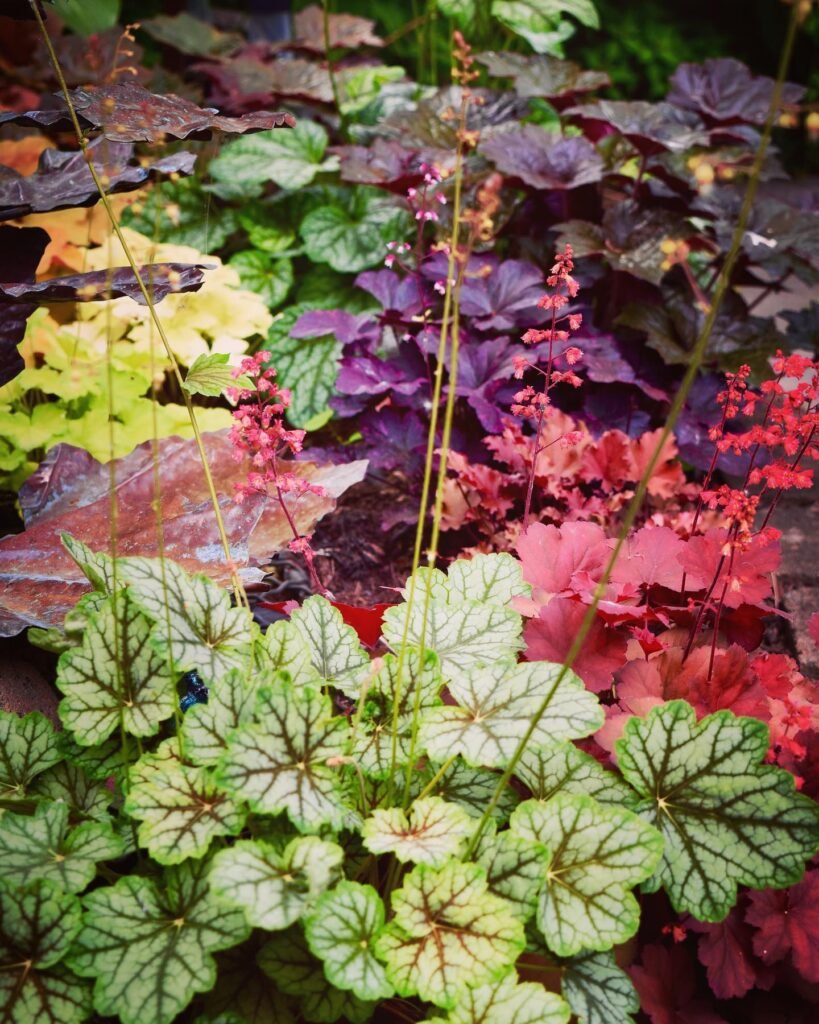
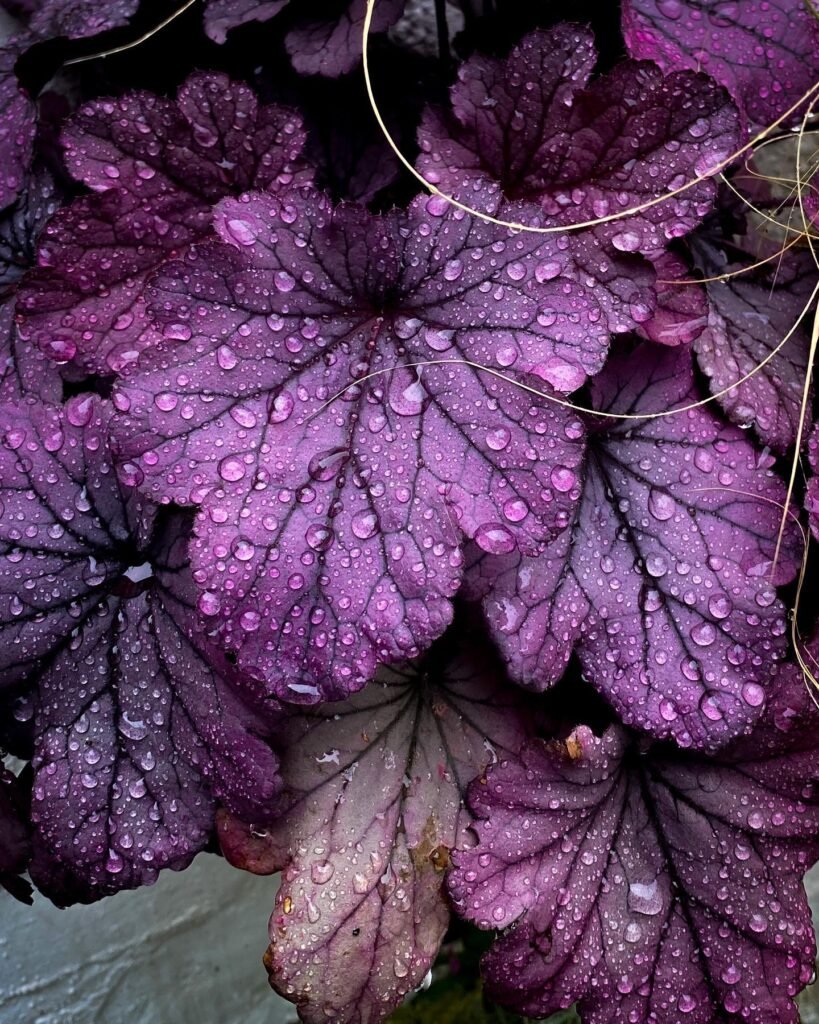
When it comes to caring for your Heuchera plants, proper watering is essential. These beautiful Coral Bells thrive in moist but well-drained soil, so finding the right balance is key. Here are some helpful watering tips for keeping your Heuchera plants happy and healthy:
- Regular watering: Heuchera plants should be watered regularly, especially during dry spells. It’s important to keep the soil consistently moist, but be cautious not to overwater them. Excessive moisture can lead to root rot, which can be detrimental to their health. So, make sure to provide them with a drink whenever the soil starts to dry out.
- Timing is everything: It’s best to water your Heuchera plants in the morning. This allows the leaves to dry out during the day, reducing the risk of fungal diseases. Wet foliage can promote the growth of fungi, so watering in the morning gives the leaves a chance to dry off before the cooler evening temperatures arrive.
- Winter watering: In the UK, winters can bring wet and cold conditions. During this time, it’s important to reduce watering to prevent the soil from becoming too wet. Heuchera plants are susceptible to root rot, and excessive moisture in the soil can lead to their demise. So, be mindful of the weather conditions and adjust your watering accordingly.

Fertilizing and Soil for Heuchera Plant
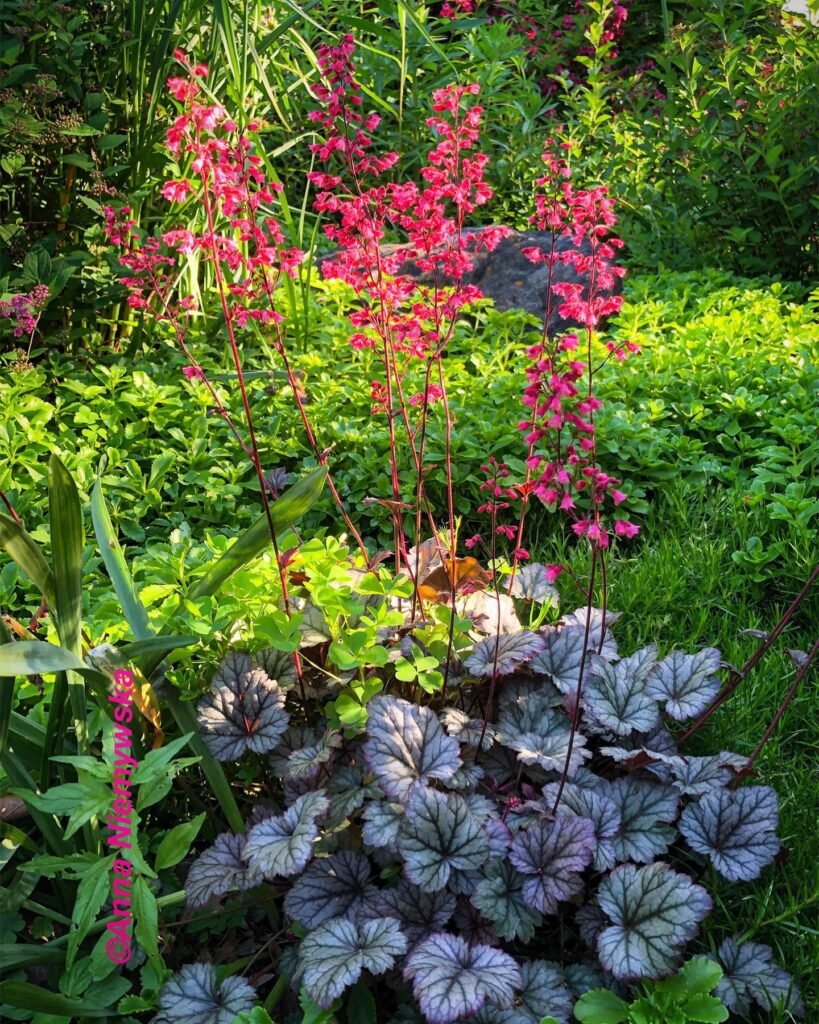
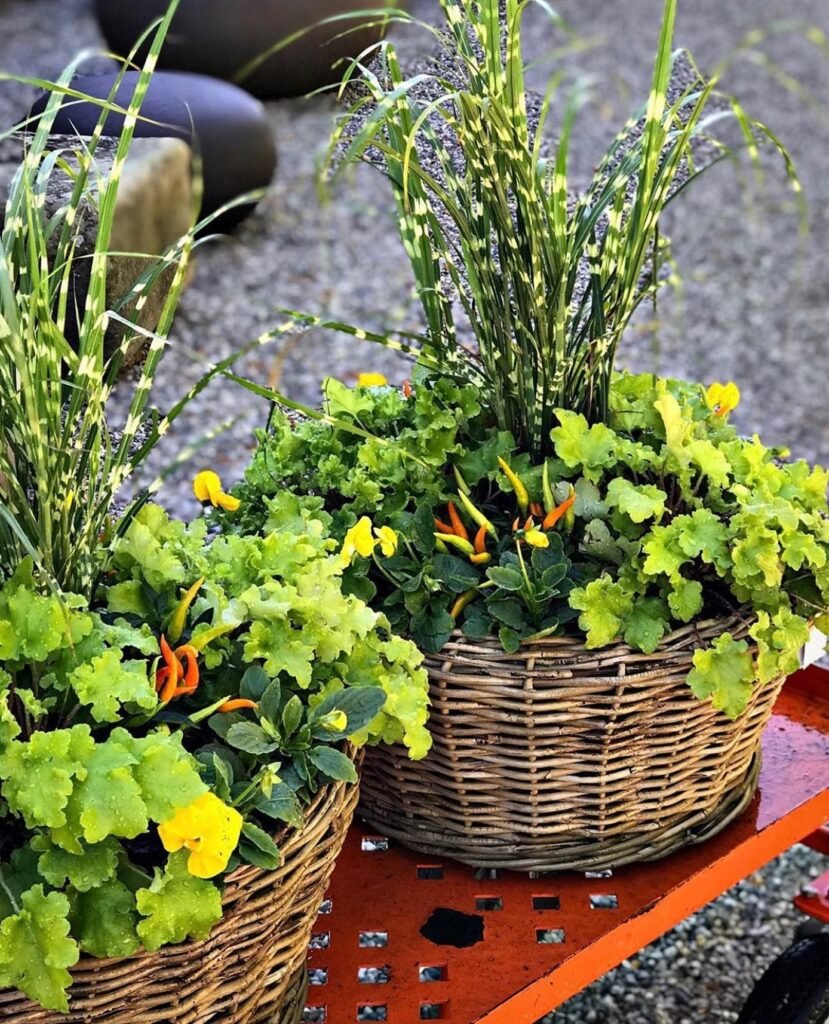
When it comes to fertilizing Heuchera plants, less is more. These stunning Coral Bells don’t require heavy fertilization but can benefit from a light application of organic compost or a balanced fertilizer, such as a 5-5-5, during the growing season. This gentle feeding will provide the necessary nutrients without overwhelming the plant.
I recommend fertilizing Heuchera plants in spring, just as new growth is emerging. This will give them a boost for the growing season ahead. If needed, you can also apply fertilizer again in midsummer to replenish any depleted nutrients.
In addition to fertilizing, the right soil is crucial for the health of Heuchera plants. These beauties prefer well-drained soil that is rich in organic matter. By ensuring good drainage, you can prevent waterlogging and the potential for root rot.
If your soil is heavy or clay-based, it’s best to grow Heuchera plants in containers or raised beds. This allows you to have better control over the soil composition and ensure optimal conditions for your plants to grow and thrive.
So remember, when taking care of your Heuchera plants, give them a gentle fertilization in spring and consider the soil type to provide them with the best growing conditions.

Pruning and Maintenance for Coral Bells

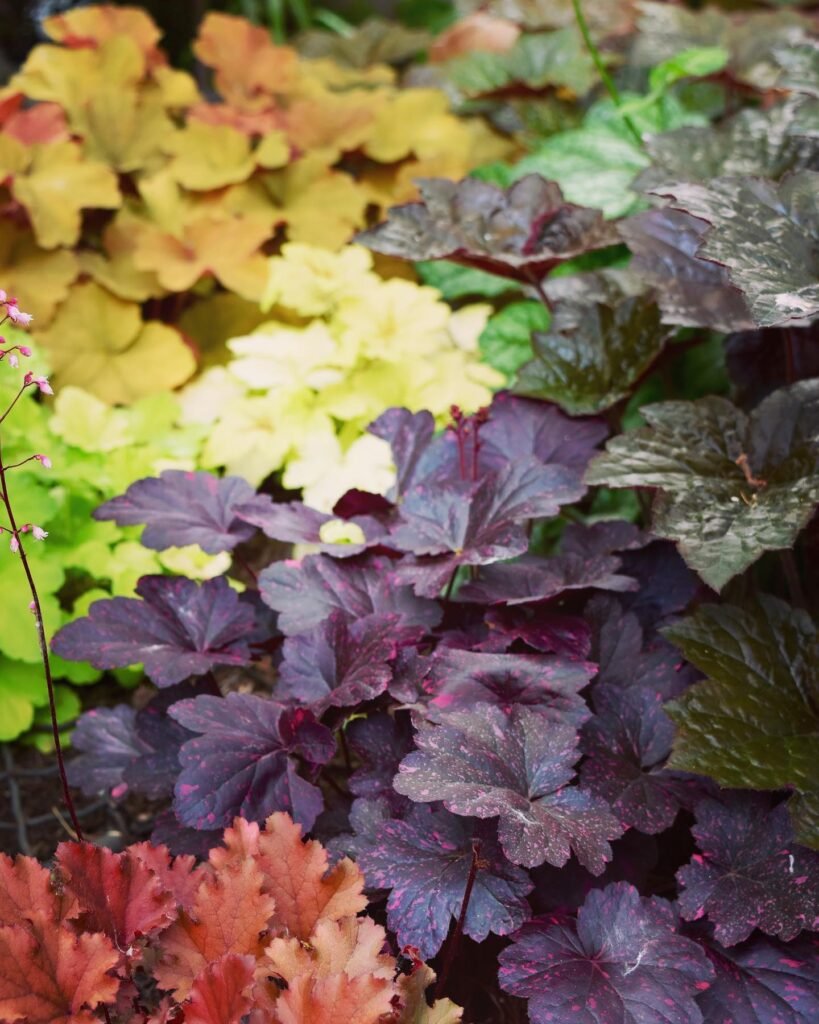
Pruning and maintaining Heuchera plants, commonly known as Coral Bells, is an essential part of their care to ensure their health and beauty.
When it comes to pruning, the focus is on removing any dead or tatty leaves and faded flower stems. This can be done at any time of the year to keep the plant looking tidy and promote new growth.
In autumn, it is recommended to tidy up the foliage by removing any old leaves. This not only prevents disease but also helps maintain the plant’s appearance during the winter months.
After around five years, Heuchera foliage may start to flatten down, losing its compact shape. In such cases, the plant can be rejuvenated by lifting and dividing it. This not only helps maintain the plant’s vigor but also provides an opportunity to propagate new plants.
By lifting the plant and dividing the crown, you can create new plants using the divisions. Be sure to plant each division with attached roots and provide them with proper care to ensure their successful establishment.

Propagating Heuchera Plant (Coral Bells)
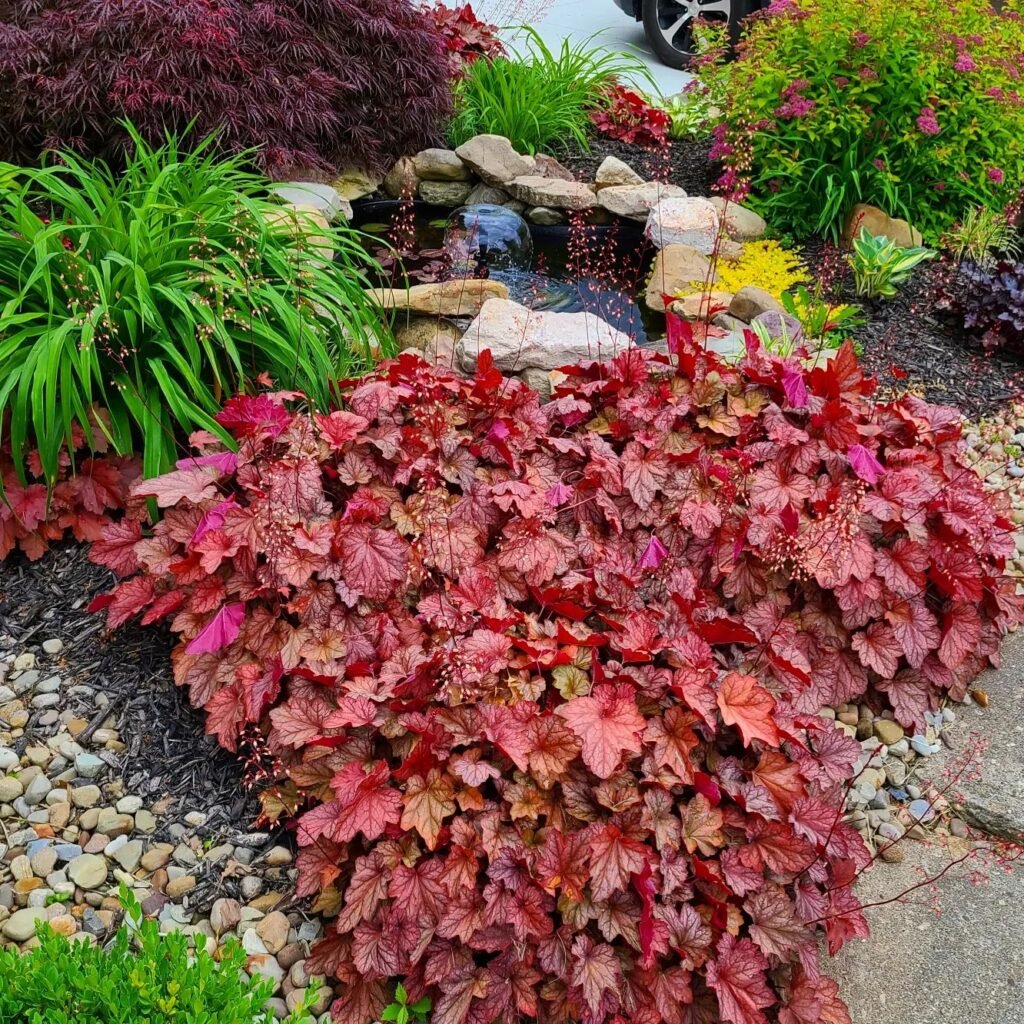
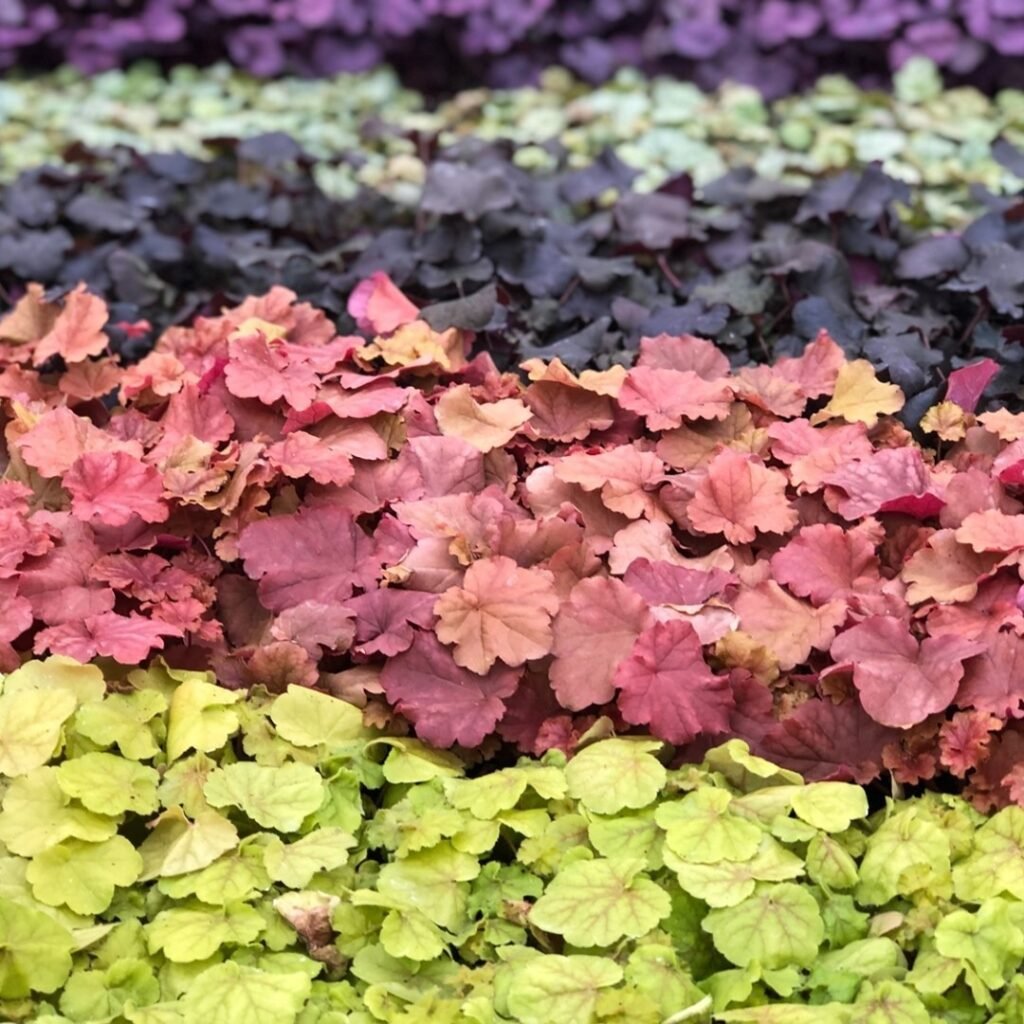
Propagating Heuchera plants is a rewarding way to expand your garden collection and rejuvenate older plants. Fortunately, propagating Heuchera plants through division is a straightforward process that can be easily done by any home gardener.
To start, carefully lift the Heuchera plant from the ground, ensuring you disturb the roots as little as possible. Once lifted, gently separate the plant’s crown into sections, making sure that each section has roots attached. This will ensure that the new plants have a good chance of establishing themselves in their new location.
When replanting the divided sections, choose a well-drained soil that matches the depth at which the Heuchera plant was previously growing. This will provide the best conditions for the new plants to thrive. After planting, water the divisions thoroughly and maintain regular watering until they establish themselves in their new environment. This will help to ensure their successful growth and development.
Propagating Heuchera plants not only allows you to create new plants for your garden but also helps to rejuvenate older plants. By dividing and replanting, you can refresh the growth of your existing Heuchera specimens and ensure their longevity.

Repotting Tips for Heuchera Plant
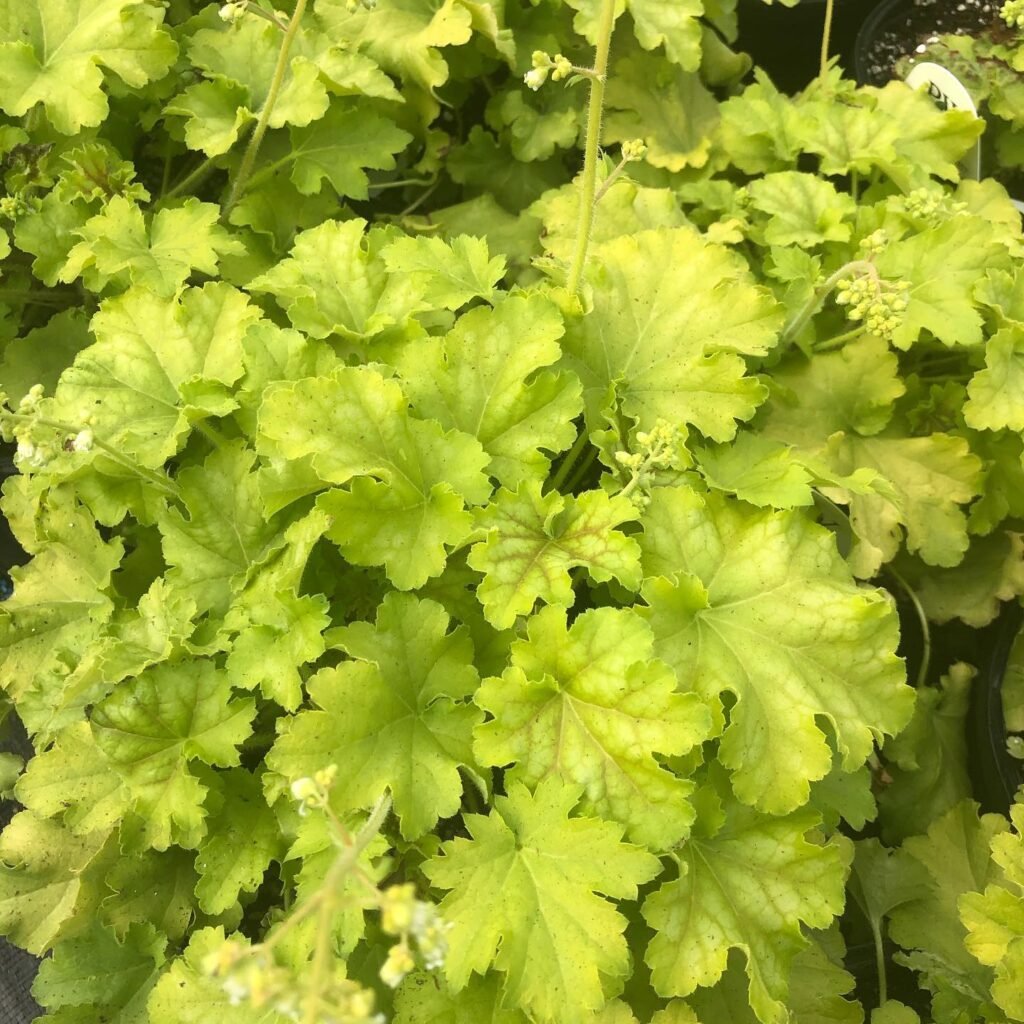
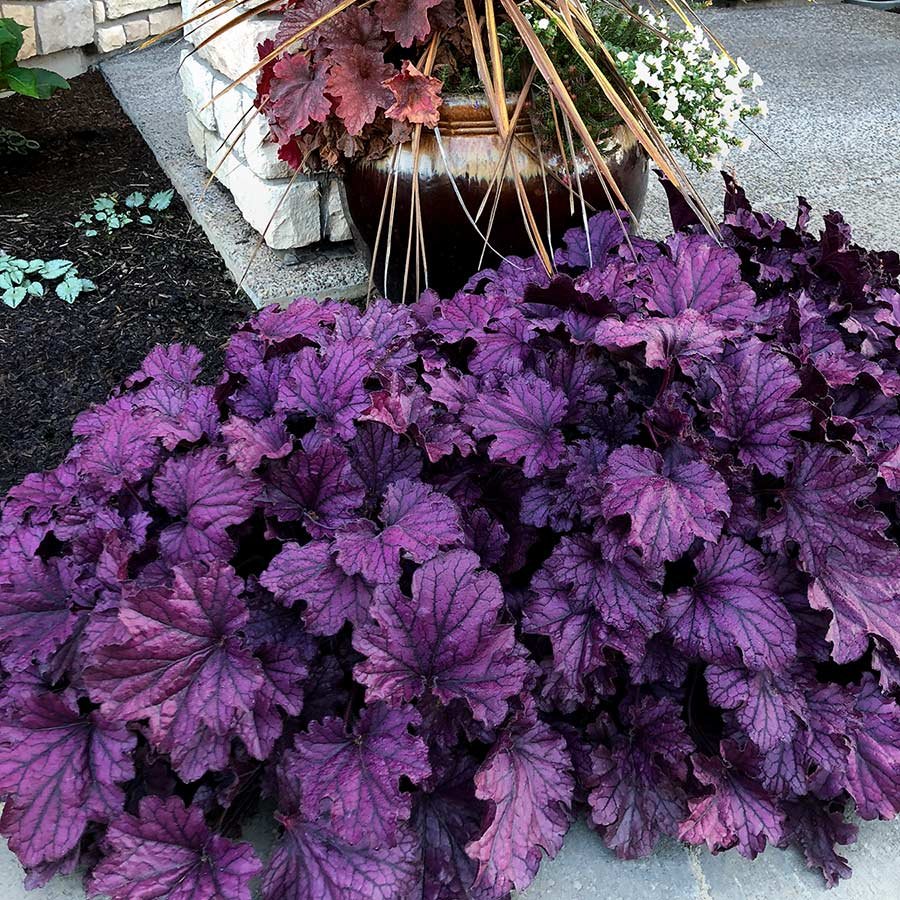
Repotting Heuchera plants is an essential part of caring for them, especially when they outgrow their current containers or when the soil becomes compacted. Here are some helpful tips to ensure successful repotting:
- Choose the right pot: Select a slightly larger pot with good drainage holes. This will allow the plant’s roots to have room to grow and prevent waterlogging.
- Prepare the plant: Gently remove the Heuchera plant from its current container, being careful not to damage the roots. If the roots are tightly bound, loosen them slightly to encourage healthy growth in the new pot.
- Place in the new pot: Position the Heuchera plant in the new pot, ensuring it sits at the same depth as it was previously growing. Fill in the gaps around the plant with fresh potting soil, gently firming it down.
- Water thoroughly: After repotting, give the Heuchera plant a thorough watering to help settle the soil and hydrate the roots. Ensure the excess water drains out of the pot.
- Continue regular care: Once repotted, continue caring for the Heuchera plant as usual, providing it with the right amount of light, water, and fertilization.
 Did you know Heuchera can thrive in a wide range of climates, from chilly northern gardens to the warm southern ones? This makes it a versatile choice for gardeners in many areas, providing year-round colour and texture.
Did you know Heuchera can thrive in a wide range of climates, from chilly northern gardens to the warm southern ones? This makes it a versatile choice for gardeners in many areas, providing year-round colour and texture.
Helpful Videos about Heuchera Plant (Coral Bells)
Check out these great videos I found on Heuchera Plants, also known as Coral Bells. They’re full of easy tips for looking after these lovely plants, perfect for anyone new to gardening!
FAQ about Heuchera Plant (Coral Bells)

Puzzled about how to best look after your Heuchera Plant, or Coral Bells? You’ve hit the right place! I’ve compiled all the key questions to make caring for your plant straightforward. Whether it’s getting the watering just right or sorting out common issues, rest assured, you’re well supported.
Coral Bells thrive in partial shade but can tolerate morning sun in the UK climate. Too much direct sun can scorch their leaves.
Water when the top inch of soil feels dry. They prefer consistently moist soil but not waterlogged conditions.
Well-draining soil rich in organic matter suits them best. They prefer a slightly acidic to neutral pH.
Yes, applying a balanced, slow-release fertilizer in spring can support their growth and leaf coloration.
Yes, they are frost hardy and can survive the UK winter. However, mulching can help protect their roots in colder regions.
Coral Bells can be propagated by division in spring. Simply separate a mature plant into smaller clumps, ensuring each has roots.
Too much sun can bleach their vibrant leaves. Consider moving them to a more shaded spot if possible.
They can attract vine weevils. Check for grubs in the soil and treat with nematodes if necessary.
Absolutely, they do well in pots with good drainage, which can also help prevent root rot.
Most varieties reach about 30cm in height and spread to around 40cm, making them great for borders or ground cover.
Yes, they produce delicate flowers on tall stems in summer, attracting bees and butterflies.
Yellow leaves could indicate overwatering or a nutrient deficiency. Adjust your care routine and consider a soil test.
They can grow in full shade but may produce fewer flowers and have less vibrant foliage.
Repot every 2-3 years to refresh the soil and give roots more space.
No, they are generally considered safe for pets.
Ensure it’s in suitable light, check for pests, and consider repotting if the soil is poor or compacted.
Yes, many varieties adapt well to the UK, offering a range of leaf colors and sizes. Choose those known for their hardiness in cooler climates.
I trust this FAQ has given you a clearer idea on how to care for your Heuchera Plant, or Coral Bells. Should you find yourself with more questions, don’t be shy to drop them in the comments. I’m here to lend a hand. Remember, we all start as beginners in the world of gardening, and there’s always something new to learn as you grow together with your leafy pal.

